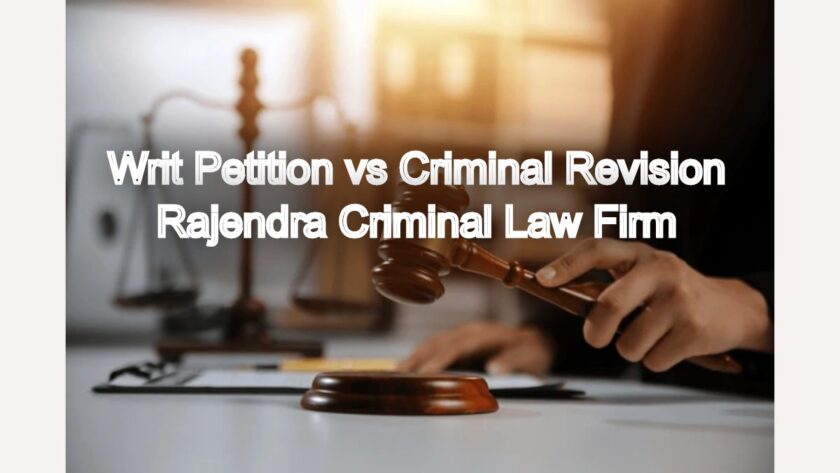Choosing between a Writ Petition Vs Criminal Revision at the Madras High Court is a crucial decision. Both are legal remedies but they serve different purposes. They operate under distinct laws and address different types of grievances. Therefore, understanding the difference is key to getting the right legal help. You need to know which one to file and when.
Writ Petition vs Criminal Revision: Rajendra Criminal Law Firm
Understanding a Writ Petition
A Writ Petition is a powerful tool. It comes from the Indian Constitution. Specifically, Article 226 gives the High Court this power. It is an extraordinary remedy. You can file it for a specific reason. The main reason is to enforce your fundamental rights. These are rights guaranteed by the Constitution.
For example, you can file a writ if the state or a public authority violates your rights. This could be your right to equality or your right to life and liberty. A writ petition also helps when a government body acts unfairly. It can be used to compel a public servant to do their duty. In addition, you can use it to challenge an illegal administrative order. The High Court can issue various types of writs. These include Habeas Corpus, Mandamus, Prohibition, Certiorari, and Quo Warranto. These writs are essentially court orders. They direct an authority to do something or to stop doing something. Thus, the scope of a writ is very wide. It is not limited to criminal matters.
Understanding a Criminal Revision
A Criminal Revision is a different kind of legal remedy. It is not based on the Constitution. Instead, it is governed by the Code of Criminal Procedure (Cr.P.C.). Specifically, Section 397 of the Cr.P.C. allows for it. The purpose of a criminal revision is to review a lower court’s order. This order must be an interlocutory or a final order.
You file a criminal revision for a specific purpose. You want the High Court to check if a lower court acted correctly. It checks for legality, correctness, or propriety. It also looks for any abuse of the process of law. A criminal revision is a direct challenge. It is against a judicial order. This order must be from a subordinate criminal court. For instance, you can file a revision against a Magistrate’s order. It can be against an order of a Sessions Court.
The Key Differences
The differences between the two are significant. First, the source of power is different. A Writ Petition comes from the Constitution. A Criminal Revision comes from the Code of Criminal Procedure. Consequently, their scope and purpose are different.
Second, the subject matter is different. A writ petition deals with fundamental rights. It also deals with other legal rights against a public authority. On the other hand, a criminal revision is specific to criminal proceedings. It is used to challenge a specific judicial order. This order must have been passed by a lower criminal court.
Third, the nature of the remedy is distinct. A writ is an extraordinary remedy. It is discretionary for the High Court to grant it. The court will not grant it for minor issues. It will only grant it for grave injustice. Conversely, a criminal revision is a statutory remedy. You can file it as a matter of right. Of course, this is subject to certain conditions.
Furthermore, the parties involved are different. In a writ petition, the petition is typically filed against the state. It can be against a public officer or a government body. It is often about a failure to perform a public duty. However, in a criminal revision, the parties are the accused and the prosecution. It is a direct challenge to a court order.
Ultimately, the grounds for relief are different. For a writ, the grounds are constitutional violations. They can also be a breach of natural justice. They can be a failure of a public duty. For a criminal revision, the grounds are errors in law. They can also be errors in procedure. They can be perversity in the lower court’s order.
When to File a Writ Petition
You should file a Writ Petition in specific situations. For example, if your detention is illegal, you can file a Writ of Habeas Corpus. This writ compels the authority to produce you in court. Similarly, you file a Writ of Mandamus when a public authority fails to perform a legal duty. You can use it to get a government department to act. It can be to get them to issue a document. Furthermore, a Writ of Certiorari is used to quash an order of a lower court. This is when the court acted beyond its jurisdiction. It is different from a revision. A writ is for a jurisdictional error. A revision is for an error of law or fact. Therefore, you should consult with a lawyer. They will advise you if your case is suitable for a writ.
When to File a Criminal Revision
You should file a Criminal Revision when a lower court passes an unjust order. For instance, if a magistrate wrongly dismisses your application. This could be an application for a certain document. You can challenge that order. Or, if the sessions court passes an order you feel is illegal, a revision is the right tool. This is a common practice. Many people file revisions against interim orders. These orders might affect their rights. They are not a final judgment. It is essential to remember a key point. You cannot challenge an interlocutory order in a revision. You can only challenge a final or an intermediate order. This is a strict rule. You must be careful with this.
Case Examples and Practical Application
Consider a practical example. A police officer denies you a copy of the First Information Report (FIR). This is a public duty. The officer has a legal obligation to provide it. You can file a Writ of Mandamus. This will compel the officer to give you the FIR. However, if a magistrate dismisses a complaint you filed, you can’t file a writ. The correct remedy is a Criminal Revision. The magistrate’s order is a judicial order. It is not an administrative one. Therefore, you must use the correct procedure. Using the wrong one will cause delay. It can lead to the dismissal of your petition.
Another example is a challenge to a bail order. The magistrate grants bail with very harsh conditions. You can file a Criminal Revision. This allows the High Court to review the conditions. The court can then modify them. However, if a public servant refuses to issue a passport, you file a Writ Petition. This is a clear case of a failure of public duty. It has nothing to do with a criminal court order.
The Role of an Expert Lawyer
You must hire an expert lawyer. They will guide you properly. Know the procedural intricacies. They understand the legal provisions. An experienced criminal lawyer can tell you the right path. They will analyze the facts of your case. Will tell you if you should file a Writ Petition or a Criminal Revision. They will also draft the petition correctly. This is a very important step. Improper drafting can lead to a case’s dismissal.
A lawyer’s expertise is vital. They can argue your case effectively. They can present the facts and the law. A good lawyer knows when a case falls under Article 226 of the Constitution. They also know when it falls under Section 397 of the Cr.P.C. Can also advise you on the chances of success. They will manage all the legal formalities.
FAQs on Writ Petition vs Criminal Revision
A Writ Petition is a constitutional remedy used to enforce fundamental rights or compel a public authority to perform its duty. It is filed under Article 226 of the Constitution. A Criminal Revision, however, is a statutory remedy under Section 397 of the Cr.P.C. It is used to challenge the legality, correctness, or propriety of an order passed by a subordinate criminal court.
Generally, no. A Writ Petition is an extraordinary remedy and the Madras High Court typically does not entertain it to challenge a judicial order of a subordinate criminal court when an alternative and effective remedy, such as a Criminal Revision, is available. A Writ is reserved for grave injustices or jurisdictional errors, not simple errors of law or fact.
A Criminal Revision can be filed against any order, including interim or final, passed by a subordinate criminal court. This includes orders from a Magistrate’s Court or a Sessions Court. However, it cannot be filed to challenge an interlocutory order, which is a key distinction to note.
You should file a Writ of Mandamus when a public servant or government body fails to perform a duty that they are legally bound to do. This could be anything from refusing to issue a document to failing to act on a legal complaint. The remedy compels the authority to act as per its legal obligation.
It is highly unlikely for the same issue to be pursued through both remedies simultaneously. The two remedies serve different purposes and are filed on distinct legal grounds. An experienced lawyer from our firm would help.
Conclusion – The Right Choice
In conclusion, the decision to file a Writ Petition or a Criminal Revision is critical. It is not a matter of choice. It is a matter of law. A Writ Petition addresses constitutional and public law issues. A Criminal Revision addresses errors in lower court criminal orders. You must understand the distinction. You must also use the correct remedy. Doing so saves time and resources. It also increases your chances of success. Ultimately, the right legal action ensures justice. We at Rajendra Criminal Law Firm are ready to assist you. We provide the right legal counsel for your specific needs.
Read More
- Recent Criminal Appeals Allowed by the Madras High Court – 2025 Review
- Anticipatory Bail in Tamil Nadu: Strategies That Work in Madras High Court
- How to Quash a False FIR Under Section 482 CrPC in Madras High Court
- Landmark Judgments of Supreme Court in Criminal Law (2024–2025)
- Can You Approach the Supreme Court Directly for Fundamental Rights Violation?
- Madras High Court Official Website:





